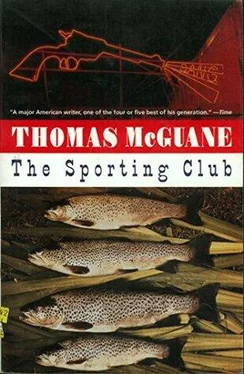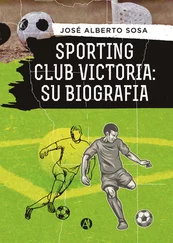“Are these people still alive?”
“Pretty much.”
Janey sighed and looked out the window. The sun was clear and late and hurtled through the trees, lighting a soup of pollen that thickened gold. It seemed a long way from Texas, a long way from the drill-master nearby who strained under his jokes in this same forest.
* * *
Business: the time had come to plan the factory picnic. The very thought threw him back, not unhappily, upon his origins as a man of affairs. His first job after taking over had been to organize the factory picnic. And to have so soon to plan it again gave him an exceedingly unpleasant sense of déjà vu. The first time, he had worked carefully, interviewing employees to determine what was wanted. Since the company employed many of the handicapped, the mainstays were out: three-legged races, leapfrog and so on. The emphasis therefore would have to be a sedentary one, and Quinn arranged for the delivery of truckloads of keg beer, and epic quantities of fried food. There would be Bingo with a professional caller and personalized (initialed) Bingo tokens; the prizes were chosen by what was considered uncanny judgment: glass-pack “Hollywood” mufflers for cars, white rubber mud-flaps with safety reflectors, turkeys, porkpie hats, barbecue sets, pink concrete yard flamingos, TV trays, plastic dogs that sat in the rear window of your car and wobbled their heads, plastic lions that sat in the rear window of your car and winked right or left when you used your turn signal, Mohawk bow-and-arrow sets, Chief Pontiac headdresses, risqué place mats, glass shower doors with leaping stags sandblasted onto their surfaces, and many other odds and ends related to automobiles, television, child diversion and sexual insinuation. The band presented a special problem because it had to be able to play both country music and polkas or it would not satisfy. Quinn had to do the auditioning and, here again, it was something of a mudbath of expanding and contracting accordions, broad Middle European faces and long, sidehill Anglo-Saxon, the electric guitars that were played in front of you with one hand plucking and the other manipulating an iron bar that sent undulant notes into the room like sea serpents; occasionally there would be a female lead singer in lacquered beehive hair whose batlike cries aroused Quinn’s interest; he would consider for a moment then, like some arbitrary crank, say that he would have to insist on polkas. Finally, as if desire had been made flesh, a quartet from River Rouge materialized in his offices, set up their equipment and with mechanical regularity played first a polka and then a country song. Nonstop. So Quinn had a band; he had prizes, activities, and he rented a small fairground with a copse of knobby, pollard elms and a brown duck pond.
Now for the picnic: the picnic did go well up to the last minutes; and the drinking had already reached a merry peak; but the minute prizes ran out, something saturnalian set in and the fighting began; the band played only when threatened; Quinn pulled grunting, punching men apart; doctored a woman who had got a heavy blow from behind. Once an enormous punch press operator began to lay about him violently with a frozen turkey, sending people screaming toward the duck pond. Quinn, trying his best to keep out of it, had to threaten firing to disarm him and the man went behind the Bingo pavilion and wept like a woman. Gradually, it began to grow calm though; and the most marked sound soon became the chatter of the old ladies at the beer counter. They had heretofore been unable to get to the head of the line; now the beer was almost gone and the great, dull silver kegs wheezed foam and moaned like barrel organs. At that moment, the finale began.
A green Chevy sedan with no one at the wheel came gliding at moderate speed, sending people running and dragging children out from in front of it. It came, stately and carnauba-waxed, pristine with its bullnose, customized hood, bubble skirts, blue-tinted windows, jiggling kewpie in the empty, azure interior, and Augustan rumble of dual exhausts; curved slowly and miraculously away from the duck pond and cracked to a stop against a pollard elm. Now everyone ran. Quinn ran, toward the car nuzzling the tree, its hind wheels churning the grassless fairground soil behind. Quinn pulled open the front door of the car to turn off the ignition and his janitor rolled out blue and vein-laced in a diabetic coma, a tiny, distant scream coming from somewhere behind the locked strenuous jaws, the chest seizing under the printed Miami palms of his sportshirt. Someone pushed in beside Quinn, authoritatively worked upon the jaws until they opened and shoved in the end of a Pepsi-Cola bottle, glass clinking against teeth, and began to pour as his other hand worked the janitor’s tongue free. For the others, this was simply the last straw and they began to leave. Quinn, kneeling beside the janitor, watched his eyes come out of their knotting as the Pepsi spilled around his neck and into the holiday shirt, watched the eyes grow clear and apologetic as he saw the retreat.
But Monday, when everyone was back docilely at the machines, Quinn was amazed to find that the party had been a success. “A good time was had by all,” his foreman confided. And behind Quinn’s grateful smile was a vision of brawling men, of their elderly mothers and mothers-in-law with somber, ill-concealed cases of beer farts, and the children themselves, all gullet, fighting over prizes and destroying everything in their paths like army ants. Still, Quinn’s smile was grateful and it was genuine.
Nevertheless, moving along the production line, which was lubricated to near silence, brought him the sense that these useful, efficient men were right now at their most minatory. The workers placed and removed, placed and removed before the presses, rhythmically; they bowed to the machine, propitiating it with a piece of cold rolled steel or a bright, solar aluminum disc; and the machine returned the bow and returned the gift, now miraculously transformed into something of purest utility. Moments later, these same objects appeared on the other side of the factory, hung on hooks, like ex-votos, and they glided through a bath of neoprene and into the ultraviolet drying rooms. The next day, out the door they went to their numberless destinies.
Yet, re-creating it in his mind, the old party held no lesson for the new; and Quinn saw no way of improving. Clearly, however, while there had been prizes, the fighting was at a minimum; that was a detail: more prizes. If only he could do it all by remote control, program the entire picnic on a punch card and keep himself far, far from their joys. He would wear a black silk tuxedo, a boiled linen shirt whiter than Antarctica, and on their day give them the occasional kindly thought.
* * *
He went to the lake to sit on the cutter. Summer was here and there was a portable lifeguard tower with a golden Teuton aloft. Quinn began immediately to run into acquaintances. He met Sheila Derndorff, a pretty girl of twenty with merry teeth, who had broken both legs dancing. Then he met, directly under the lifeguard tower, undulant in flaglike madras, Charles Murray, a gifted trial lawyer from Cincinnati and amateur of literature who had, fifteen years before, in an extravagant gesture of literary Anglo-faggotry, become a Roman Catholic. To have been born a Catholic and lapsed, as Quinn had done, was intolerable to Murray who nevertheless continued to regard Quinn as an accomplice in the international Romish plot. Today, he began by lamenting anew the passing of Pius Twelve, the last, in his view, of the intransigent aristocratical Popes, whose death began an age of unparalleled prole boobery in Rome. He meant, naturally, Pope John, whom he called a “loutish mountain wop.” Yes, Quinn agreed, yes, yes, yes. Murray’s left hand was clutched around a pair of tortoise-shell sunglasses. He wore a raw-silk summer blazer and squinted conspiratorially at the sun. Behind him a fat woman herded children, her pocked buttocks lurching with the effort. “Your friend Stanton is going to start a squabble around here,” Murray confided. “And I am anxious to see— Hi, Janet darling! You better run! Or I’ll bite your leg! — to see how it turns out.”
Читать дальше












